Tag: professional development
Sign up for the 2023 Oral History Center Educational Programs
The Oral History Center is pleased to announce that applications are open for the 2023 Introductory Workshop and Advanced Institute!
Introductory Workshop: Friday, March 3 [this event has passed]
Advanced Institute: M–F, August 7–11 [applications are now closed]The OHC is offering online versions of our educational programs again this year
Introductory Workshop: Friday, March 3, 8:30 a.m.–2:30.p.m., via Zoom
This event has passed, but we’d love to see you in 2024. Sign up for our newsletter to find out the date as soon as it’s decided.
The 2023 Introduction to Oral History Workshop will be held via Zoom on Friday, March 3, from 8:30 a.m.–2:30 p.m. Pacific Time, with breaks woven in. Applications are now being accepted on a rolling basis. Please apply early, as spots fill up quickly.
Apply here.
This workshop is designed for people who are interested in an introduction to the basic practice of oral history and learning best practices. The workshop serves as a companion to our more in-depth Advanced Oral History Summer Institute held in August.
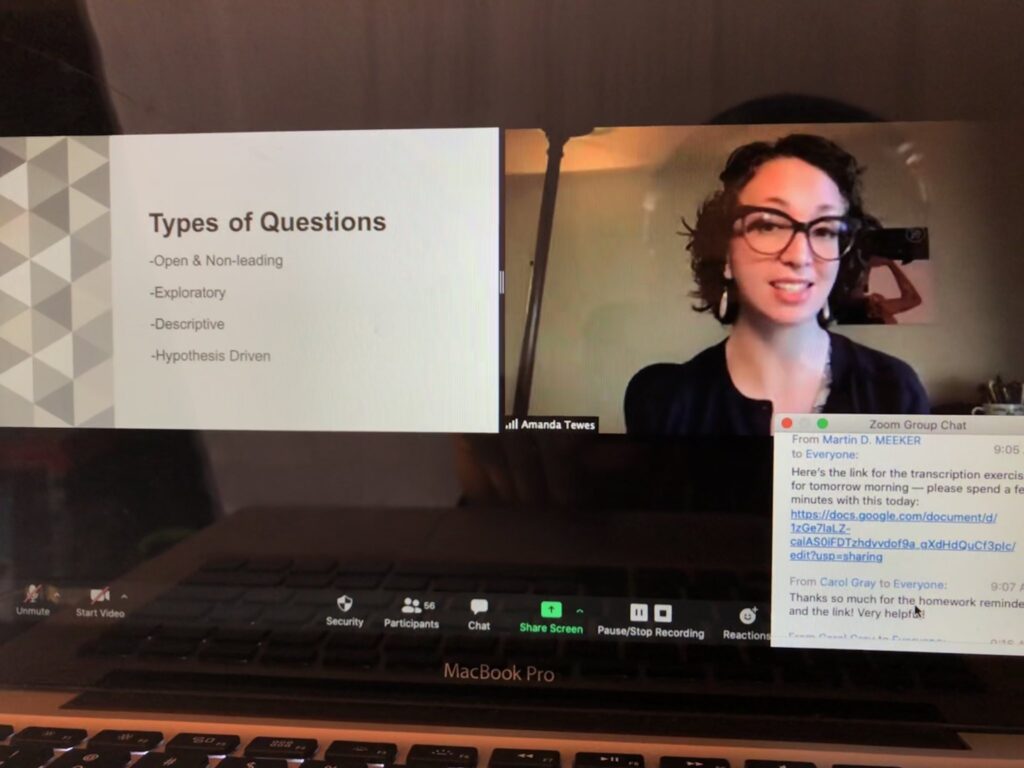
This workshop focuses on the “nuts-and-bolts” of oral history, including methodology and ethics, practice, and recording. It will be taught by our seasoned oral historians and include hands-on practice exercises. Everyone is welcome to attend the workshop. Prior attendees have included community-based historians, teachers, genealogists, public historians, and students in college or graduate school.
Tuition is $150. We are offering a limited number of participants a discounted tuition of $75 for students, independent scholars, or those experiencing financial hardship. If you would like to apply for discounted tuition, please indicate this on your application form and we will send you more information. Please note that the OHC is a soft money research office of the university, and as such receives precious little state funding. Therefore, it is necessary that this educational initiative be a self-funding program. Unfortunately, we are unable to provide financial assistance to participants other than our limited number of scholarships. We encourage you to check in with your home institutions about financial assistance; in the past we have found that many programs have budgets to help underwrite some of the costs associated with attendance. We will provide receipts and certificates of completion as required for reimbursement.
Applications are accepted on a rolling basis. We encourage you to apply early, as spots fill up quickly.
If you have specific questions, please contact Shanna Farrell at sfarrell@library.berkeley.edu.
Advanced Institute: M–F, August 7–11, 8:30 a.m.–2 p.m., via Zoom
Applications are now closed, but we’d love to see you in 2024. Sign up for our newsletter to find out the date as soon as it’s decided.
About the Institute
The Oral History Center is offering a virtual version of our one-week advanced institute on the methodology, theory, and practice of oral history. This will take place from August 7–11, 2023. The Advanced Institute will be held online.
The cost of the Advanced Institute has been adjusted to reflect the online nature of this year’s program. Tuition is $600. See below for more details.
The institute is designed for graduate students, postdoctoral fellows, university faculty, independent scholars, and museum and community-based historians who are engaged in oral history work. The goal of the institute is to strengthen the ability of its participants to conduct research-focused interviews and to consider special characteristics of interviews as historical evidence in a rigorous academic environment.
We ask that applicants have a project in mind that they would like to workshop during the week. All participants are required to attend small daily breakout groups in which they will workshop projects.
In the sessions, we will devote particular attention to how oral history interviews can broaden and deepen historical interpretation situated within contemporary discussions of history, subjectivity, memory, and memoir.
Apply here.
Overview of the Week
The institute is structured around the life cycle of an interview. Each day will focus on a component of the interview, including foundational aspects of oral history, project conceptualization, the interview itself, analytic and interpretive strategies, and research presentation and dissemination.
Instruction will take place online from 8:30 a.m.–2 p.m. Pacific Time, with breaks woven in. There will be three sessions a day: two seminar sessions and a workshop. Seminars will cover oral history theory, legal and ethical issues, project planning, oral history and the audience, anatomy of an interview, editing, fundraising, and analysis and presentation. During workshops, participants will work throughout the week in small groups, led by faculty, to develop and refine their projects.
Participants will be provided with a resource packet that includes a reader, contact information, and supplemental resources. These resources will be made available electronically prior to the Institute, along with the schedule.
Applications and Cost
The cost of the institute is $600. We are offering a limited number of participants a discounted tuition of $300 for students, independent scholars, or those experiencing financial hardship. If you would like to apply for discounted tuition, please indicate this on your application form and we will send you more information.
Please note that the OHC is a soft money research office of the university, and as such receives precious little state funding. Therefore, it is necessary that this educational initiative be a self-funding program. Unfortunately, we are unable to provide financial assistance to participants other than our limited number of scholarships. We encourage you to check in with your home institutions about financial assistance; in the past we have found that many programs have budgets to help underwrite some of the costs associated with attendance. We will provide receipts and certificates of completion as required for reimbursement.
Applications are accepted on a rolling basis. We encourage you to apply early, as spots fill up quickly.
Questions?
Please contact Shanna Farrell at sfarrell@library.berkeley.edu with any questions.
About the Oral History Center
The Oral History Center of The Bancroft Library at UC Berkeley preserves voices of people from all walks of life, with varying political perspectives, national origins, and ethnic backgrounds. We are committed to open access and our oral histories and interpretive materials are available online at no cost to scholars and the public. Sign up for our monthly newsletter featuring think pieces, new releases, podcasts, Q&As, and everything oral history. Access the most recent articles from our home page.
A LAUC-B Conference to Remember!

LAUC-B is the Berkeley chapter of the Librarians Association of the University of California, and it helps us librarians in so many ways. When we come to campus to interview, we have lunch with LAUC-B representatives (and the conversation is confidential, so we can ask the REAL questions we have). When we arrive as new librarians, LAUC-B connects us with mentors. It provides support for our promotion and review process, and it provides a strong sense of community as we navigate this complicated campus.
One important thing LAUC-B does is offer professional development sessions, culminating in its conference every two years. The 2021 conference (which we posted about here the other day) just concluded, and multiple attendees, from all over the country (and even internationally) said that it was the best one they’ve attended in the past year (just to pat ourselves on the back a little bit!). So, what does a great librarian conference look like?
First of all, it takes a village; this year, for the first time, we Berkeley librarians welcomed librarians from other UC campuses to help us, and we had planning committee members from UCLA, UC Irvine, and UC San Diego. Second, it takes communication; in the online world created by the pandemic, at the same time we both needed to get the word out widely, and we were able to, by using email lists, social media, and other channels. This was so important, because the conference content—which was amazing—depended on us reaching a range of people and settings and locations. Third, it takes flexibility (with a large dose of preparation)! The planning committee was taking the conference from its historical in-person format to happening online for the first time, and that came with many challenges, even given the wonderful support from the Library Events Department—we changed conference platforms at the last minute, we became experts at Zoom bombing prevention, and learned more than we thought possible about captioning so that we could be ADA compliant.
The title of the conference is “Reimagining Libraries Through Critical Library Practices”, and our description notes that: “Library work is embedded in and inherently tied to socio-political circumstances. The programming in this conference examines librarianship through the lenses of social justice, diversity, equity, inclusion and anti-racist work, Black studies, Latinx studies, Indigenous studies, cultural and critical ethnic studies, intersectional feminism, critical disability studies, postcolonial and decolonial studies, and queer interventions in digital studies.”
We felt extremely fortunate that the proposals we received were so on point and so strong and deep, including: invited keynote presentations from Clara Chu and Lalitha Nataraj; 6 additional featured presentations; 5 lightning talks; and 11 posters (with which attendees had two different time slots to engage). Many of the presenters included a land acknowledgement and/or a positionality statement as they began their talks, engaging the attendees to consider their own locations and positions, and the UC Berkeley statement included this Rematriation Resource Guide from the Sogorea Te’ Land Trust. Attendees also agreed to uphold the conference’s Code of Conduct Statement.
If you’d like a sense of the 2-day event, please take a look at the conference website, and also at our Twitter hashtag. Session recordings will soon be available, linked on the website and hosted on the Library’s YouTube channel. Also notable were the elegant design offerings, including the logo you see above, which were created by UC Berkeley Library staffer and graphic designer Sarah Chieko Bonnickson, as well as the atmospheric and stress-reducing playlist, which was relayed between sessions and about which people raved, by UC Berkeley librarian Kristina Bush. If you have questions or comments, feel free to contact us at laucbconfinfo [at] lists.berkeley.edu, and please enjoy the Twitter screenshots below, while we enjoy our (distanced) celebratory beverages!
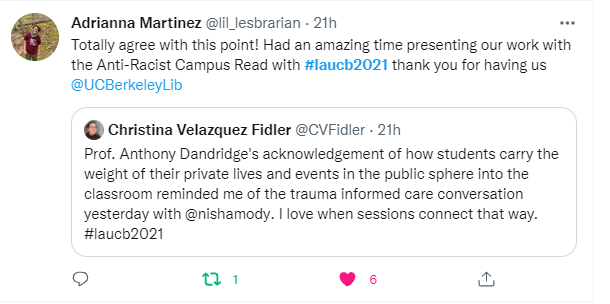
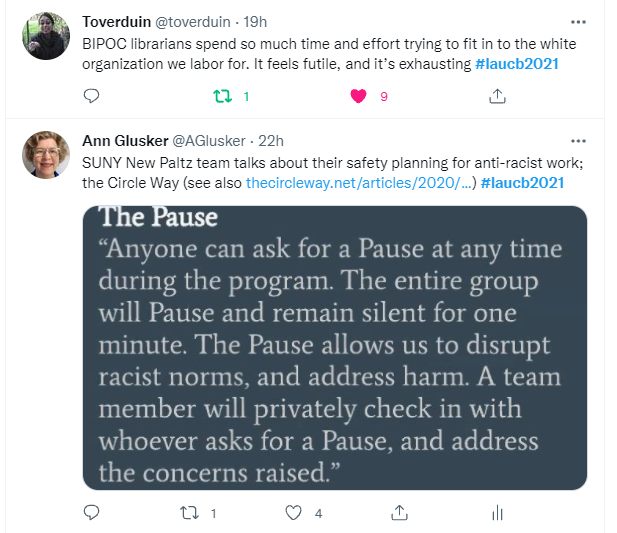
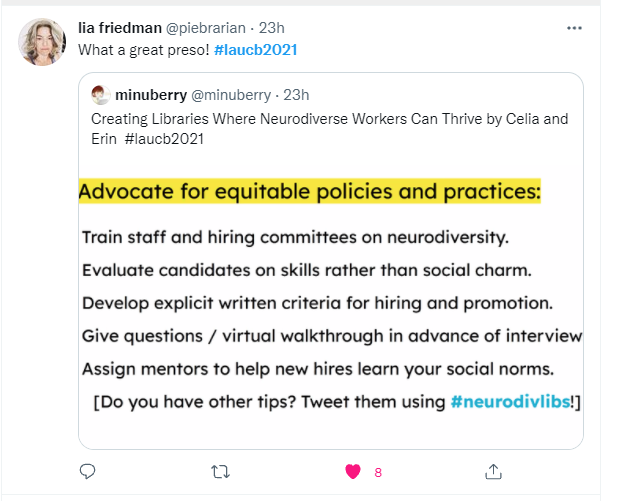
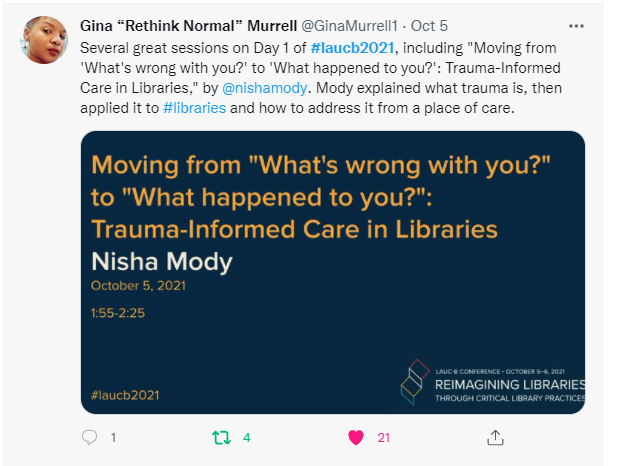
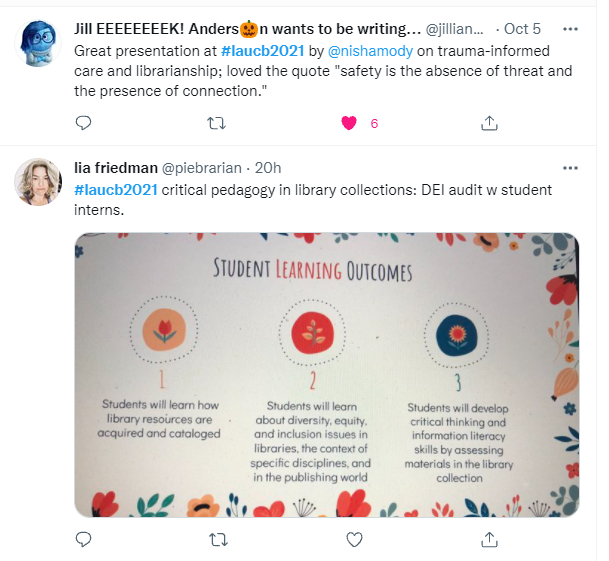
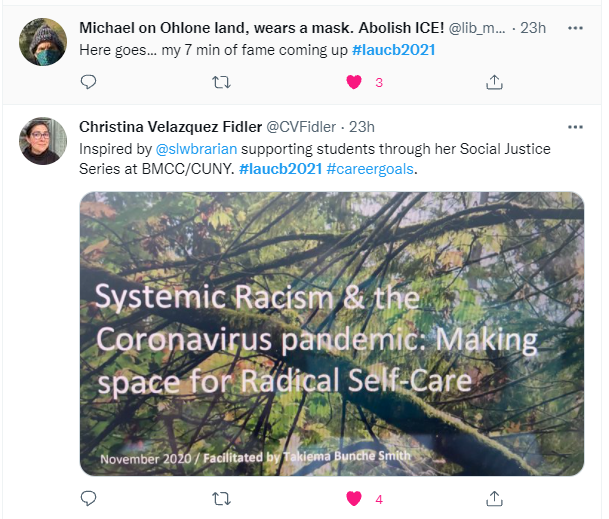
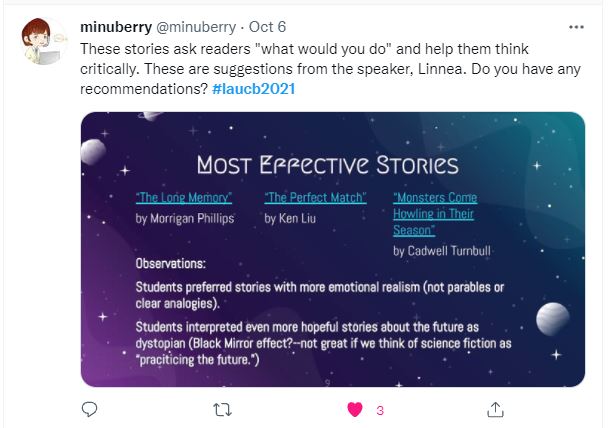
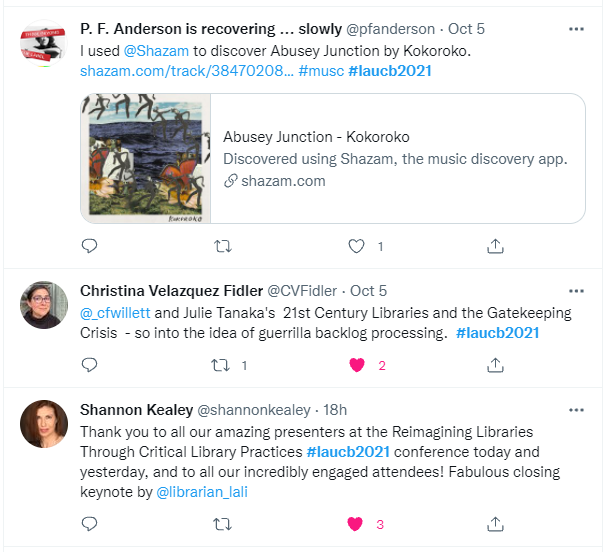
Practice Makes Published: Developing Skills to Navigate Today’s Publishing Landscape
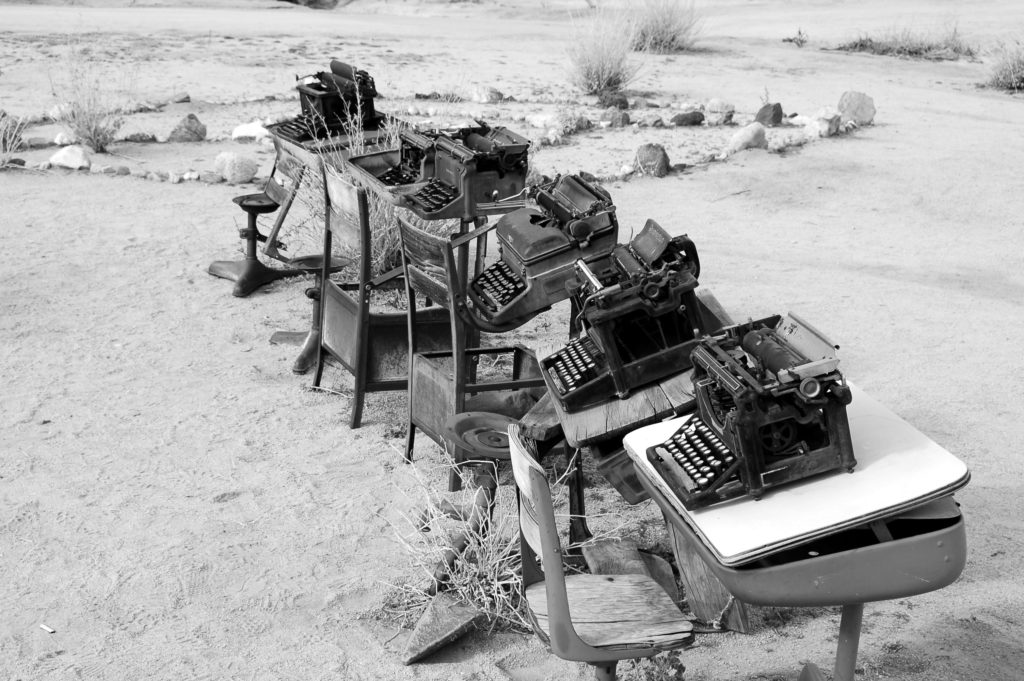
Photo by Matt Artz on Unsplash
We’re more than a month into the fall semester, and if you’re a graduate student or postdoc you’ve probably been thinking about some of the milestones on your horizon, from filing your thesis or dissertation to pitching your first book project or looking for a job.
While we can’t write your dissertation or submit your job application for you, the Library can help in other ways! We are collaborating with GradPro in October to offer a series of professional development workshops for grad students, postdocs, and other early career scholars to guide you through important decisions and tasks in the research and publishing process, from preparing your dissertation to building a global audience for your work.
- October 23: Copyright and Your Dissertation
- October 24: From Dissertation to Book: Navigating the Publication Process
- October 26: Managing and Maximizing Your Scholarly Impact
Similar to a workshop series we offered last year, these sessions are focused on helping early career researchers develop real-world scholarly publishing skills and apply this expertise to a more open, networked, and interdisciplinary publishing environment.
These October workshops are also taking place during Open Access Week 2018, an annual global effort to bring attention to Open Access around the world and highlight how the free, immediate, online availability of scholarship can remove barriers to information, support emerging scholarship, and foster the spread of knowledge and innovation.
Below is the list of next month’s workshop offerings. Join us for one workshop or all three! Each session will take place from 1:00 to 2:30 pm at the Graduate Professional Development Center, 309 Sproul Hall. Please RSVP at the links below.
Light refreshments will be served at all workshops.
If you have any questions about these workshops, please get in touch with schol-comm@berkeley.edu. And if you can’t make it to a workshop but still need help with your publishing, we are always here to help!
Copyright and Your Dissertation
Tuesday, October 23 | 1-2:30 p.m. | 309 Sproul Hall
This workshop will provide you with a practical workflow for navigating copyright questions and legal considerations for your dissertation or thesis. Whether you’re just starting to write or you’re getting ready to file, you can use this workflow to figure out what you can use, what rights you have, and what it means to share your dissertation online.
From Dissertation to Book: Navigating the Publication Process
Wednesday, October 24 | 1-2:30 p.m. | 309 Sproul Hall
Hear from a panel of experts – an acquisitions editor, a first-time author, and an author rights expert – about the process of turning your dissertation into a book. You’ll come away from this panel discussion with practical advice about revising your dissertation, writing a book proposal, approaching editors, signing your first contract, and navigating the peer review and publication process.
Managing and Maximizing Your Scholarly Impact
Friday, October 26 | 1-2:30 p.m. | 309 Sproul Hall
This workshop will provide you with practical strategies and tips for promoting your scholarship, increasing your citations, and monitoring your success. You’ll also learn how to understand metrics, use scholarly networking tools, evaluate journals and publishing options, and take advantage of funding opportunities for Open Access scholarship.
Professional Development: Business Communications
Do you want to learn how to communicate effectively? Want to understand diverse audiences and build sound arguments? Then this class might be of interest to you!
The Business Communications self-paced course will sharpen your writing, presentation, and interpersonal communication skills to help you succeed at work. You will learn a range of successful practices and guidelines that have been derived from both research and experience.
What you’ll learn:
* Build sound and logical arguments using the best evidence available
* Communicate effectively
* Understand how to communicate with diverse audiences
* Create a variety of effective and clearly written supporting documents to communicate better
Course length: 6-7 weeks
Time involved: 3-5 hours/week
Price: Free, with a Verified Certificate available for $150
Institution: University of British Columbia
Instructor: Marlisse Silver Sweeney Lecturer, Law and Business Communications Group UBC Sauder School of Business
Professional Development: Organizational Behaviour
Have you ever wanted to learn more about about the effects of organizational structures on the behaviour of employees? This free self-paced course, part of the Business Fundamentals MicroMasters program, will teach you to think about the organization as a whole and to examine how it behaves.
What you’ll learn
* Describe and apply key organizational behaviour concepts
* Identify sources of power, motivation, and commitment in an organizational setting
* Improve teamwork skills by understanding team dynamics
* Review and recommend adjustments to organization structures, design and culture
Begins: April 9
Course length: 6-7 weeks
Time involved: 3-5 hours/week
Price: Free, with a Verified Certificate available for $150
Institution: University of British Columbia
Instructor: Perry Atwal, UBC Sauder School of Business
Professional Development: Performance Management Series
Do you want to learn more about performance management? Are you interested in quality improvement for you and your team? Then this might be of interest to you. As part of the National Public Health Improvement Initiative funded by the Centers for Disease Control and Prevention (CDC), the New York State Department of Health Office of Public Health Practice has collaborated with the Empire State Public Health Training Center (ESPHTC) to create and make available the Performance Management Training Series.
Courses in the series:
– Introduction to Performance Management
– Basics of Quality Improvement for Public Health Practitioners
– Performance Measurement
– Quality Improvement Team Development
– Targeting Improvement with AIM Statements
Time involved: about an hour per module
Price: Free
Professional Development: Teamwork & Collaboration online course
Do you work in a team environment? Would you like to learn more about decision-making, consensus-building, and problem-solving within a group environment? This edX free online course may help shed some light on these skills.
Topics in the course include:
– Team formation and development
– Building, leading, organizing, and motivating teams
– Managing conflict in groups to build productive professional relationships
– Collaboration among cross-functional teams
– Interpersonal relationship dynamics in small groups
Begins: January 15, 2018
Course length: 3 weeks
Time involved: 6-8 hours/week
Price: Free with a Verified Certificate available for $49 if desired
Instructor: David Neumann, Professor, School of Communication, Rochester Institute of Technology (RIT)
Find out more about this class including how to register at the edX website.
Professional Development: Business Communications
Would you like help in learning to communicate effectively, understand diverse audiences and build sound arguments? Then this self-paced ed.x class might be of interest to you!
In this course, you will learn how to sharpen your writing, presentation, and interpersonal communication skills to help you succeed at work. You will see successful practices and guidelines drawn from both research and experience.
What you’ll learn:
* Build sound and logical arguments using the best evidence available
* Communicate effectively in a business setting
* Understand how to communicate with diverse audiences
* Create a variety of effective and clearly written supporting business documents to better communicate
Begins: November 13
Course length: 6-7 weeks
Time involved: 3-5 hours/week
Price: Free, with a Verified Certificate available for $150
The University of British Columbia offers this instruction provided by Marlisse Silver Sweeney Lecturer, Law and Business Communications Group UBC Sauder School of Business.
Professional Development: Mindful Leadership: An online class
Have you ever wanted to incorporate mindfulness into your actions at work? Would you like to learn how to include it in your interactions at work? If so, then you might want to take this free online class offered by GovLoop.
Mindful leadership means engaging in your work and your team, skillfully and in the moment. Mindfulness can help you prioritize personal well-being and transform the workplace culture around you, one interaction at a time.
Join this class to learn how to bring mindful presence to your interactions, the importance of building trust within yourself and colleagues, as well as how to cultivate an overall sense of meaningfulness at work.
You will learn:
* What mindful leadership in action really looks like.
* The benefits of bringing intention to your work style and interactions.
* How your organization as a whole can benefit from mindfulness.
Date: 9/13/2017
Time: 11am-noon
Price: Free
Instructor: Sarah Marbach, Marketing Manager and Mindfulness Advocate, Aetna
Professional Development: Evidence-Based Management Foundations
Have you wanted to learn about the theory behind management practice? Do you want to update you knowledge of management theories and concepts? If so, then you might want to take this free online course offered by edX.
In this course, students will spend time dissecting the evidence in support of foundational theories and concepts of management. Students will also learn to critically assess existing management practice in modern organisations, and to evalte the potential of emerging research and evidence in key management domains. Learners will explore the evolution of management thinking, organizational design, human resource management and more.
This course is designed for both emerging leaders and established managers.
Begins: August 8 (self-paced)
Course length: 6 weeks
Time involved: 8-10 hours/week
Price: Free, with a Verified Certificate available for $149
Institution: Australian National University
Instructor: Andrew Bradly, Senior Lecturer in International Business at the Australian National University